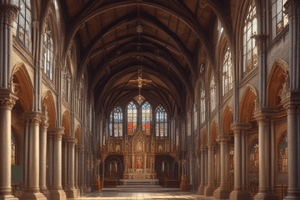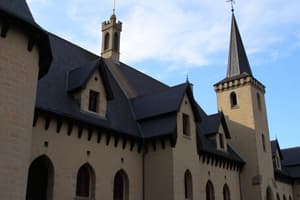Podcast
Questions and Answers
What was the predominant source of knowledge during the Middle Ages in Europe?
What was the predominant source of knowledge during the Middle Ages in Europe?
- Philosophical reasoning from ancient texts
- Cultural traditions and folklore
- Scientific experiments and observations
- The Bible and teachings approved by the Church (correct)
Which model of the universe was widely accepted during the Middle Ages?
Which model of the universe was widely accepted during the Middle Ages?
- Geocentric model (correct)
- Spherical model
- Heliocentric model
- Quantum model
How did the Church's authority affect curiosity about the natural world?
How did the Church's authority affect curiosity about the natural world?
- It encouraged scientific inquiry.
- It had no significant impact.
- It promoted travel to explore the universe.
- It strongly discouraged curiosity. (correct)
Which of the following groups made up the societal structure during the Middle Ages?
Which of the following groups made up the societal structure during the Middle Ages?
What role did Christianity play in the societal structure of the Middle Ages?
What role did Christianity play in the societal structure of the Middle Ages?
What limitation did the Church’s teachings impose on people’s education during the Middle Ages?
What limitation did the Church’s teachings impose on people’s education during the Middle Ages?
What was a consequence of the centralized, faith-based knowledge system during the Medieval period?
What was a consequence of the centralized, faith-based knowledge system during the Medieval period?
Which philosopher's concept largely contributed to the geocentric model of the universe?
Which philosopher's concept largely contributed to the geocentric model of the universe?
What aspect of the medieval worldview began to change by the late premodern era?
What aspect of the medieval worldview began to change by the late premodern era?
Which figure proposed the heliocentric model, contradicting the Church's beliefs?
Which figure proposed the heliocentric model, contradicting the Church's beliefs?
Which of the following was a key contribution of Galileo Galilei during the Scientific Revolution?
Which of the following was a key contribution of Galileo Galilei during the Scientific Revolution?
What was a major effect of the Scientific Revolution on European society?
What was a major effect of the Scientific Revolution on European society?
Francis Bacon is known for emphasizing which aspect of scientific inquiry?
Francis Bacon is known for emphasizing which aspect of scientific inquiry?
What idea did René Descartes famously express?
What idea did René Descartes famously express?
Which advancement did Andreas Vesalius contribute to during the Scientific Revolution?
Which advancement did Andreas Vesalius contribute to during the Scientific Revolution?
What was a key philosophical shift during the Scientific Revolution?
What was a key philosophical shift during the Scientific Revolution?
Which of the following best describes the role of the Church during the transition to the Scientific Revolution?
Which of the following best describes the role of the Church during the transition to the Scientific Revolution?
What transformation did the Scientific Revolution bring to European perspectives on knowledge?
What transformation did the Scientific Revolution bring to European perspectives on knowledge?
Flashcards
Geocentric Model
Geocentric Model
The belief that the Earth is the center of the universe.
Heliocentric Model
Heliocentric Model
The belief that the Sun is the center of the solar system.
Who was Nicolas Copernicus?
Who was Nicolas Copernicus?
A Polish astronomer who proposed the heliocentric model, challenging the Church's geocentric view.
Who was Tycho Brahe?
Who was Tycho Brahe?
Signup and view all the flashcards
Who was Johannes Kepler?
Who was Johannes Kepler?
Signup and view all the flashcards
Who was Galileo Galilei?
Who was Galileo Galilei?
Signup and view all the flashcards
What is the Scientific Method?
What is the Scientific Method?
Signup and view all the flashcards
Who was Isaac Newton?
Who was Isaac Newton?
Signup and view all the flashcards
What was the Renaissance?
What was the Renaissance?
Signup and view all the flashcards
What was the impact of the Scientific Revolution?
What was the impact of the Scientific Revolution?
Signup and view all the flashcards
Medieval Social Order
Medieval Social Order
Signup and view all the flashcards
Medieval Worldview
Medieval Worldview
Signup and view all the flashcards
Ptolemaic Universe
Ptolemaic Universe
Signup and view all the flashcards
Religious Authority
Religious Authority
Signup and view all the flashcards
Limited Education
Limited Education
Signup and view all the flashcards
Status Quo
Status Quo
Signup and view all the flashcards
Centralized Knowledge
Centralized Knowledge
Signup and view all the flashcards
Study Notes
Premodern European Worldview
- Medieval Europe (500-1500 CE) society was structured around three groups: fighters, priests, and workers.
- Christianity was central, with God at the universe's core.
- Church teachings dominated knowledge, education, and policies.
- The geocentric model, placing Earth at the center, was widely accepted, based on Aristotle and Ptolemy's theories.
- Earth was considered "heavier" than celestial bodies, which orbited it.
- Humans were seen as the most important beings, created in God's image and placed at the universe's center.
- Religious authority limited curiosity about the natural world.
- Most people were uneducated, relying on Church teachings.
- Travel was rare, and new ideas spread slowly.
Shift in Worldview
- Late premodern factors challenged the medieval worldview:
- Cultural Unity and Church Role: Catholic faith unified Europe, but limited intellectual diversity.
- Church's Power: Church dominance dictated laws, hindering alternative knowledge exploration.
- Desire for New Knowledge: Trade, cultural contact, and the Renaissance fueled curiosity.
- These changes paved the way for the Scientific Revolution.
Scientific Revolution
- The Scientific Revolution significantly shifted European thinking, replacing faith with observation, experimentation, and reason.
- Key Figures & Innovations:
- Copernicus: Proposed the heliocentric model, placing the sun at the center of the solar system.
- Brahe and Kepler: Brahe's data and Kepler's elliptical orbit studies supported the heliocentric model.
- Galileo: Used a telescope to observe Jupiter's moons and the cosmos, supporting the heliocentric model, but faced persecution.
- Bacon: Promoted the scientific method, focusing on observation and experimentation.
- Descartes: Emphasized reason, with the famous quote "I think, therefore I am."
- Newton: Unified science and mathematics with his theory of gravity and laws of motion.
- Vesalius: Revolutionized anatomy through human dissection.
- Impact:
- The universe became viewed through natural laws, discoverable through science.
- Observation and evidence replaced religious tradition as knowledge foundations.
- The Scientific Revolution established a foundation for modern science and ongoing innovations.
Studying That Suits You
Use AI to generate personalized quizzes and flashcards to suit your learning preferences.




